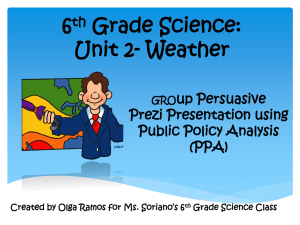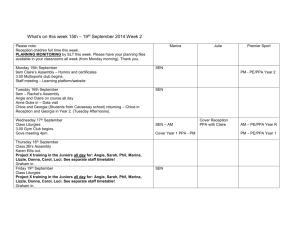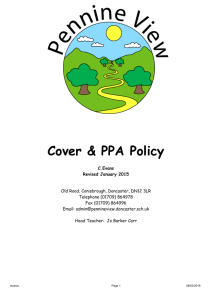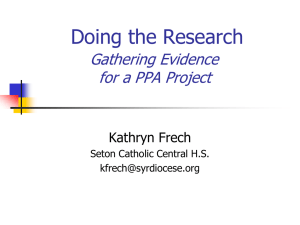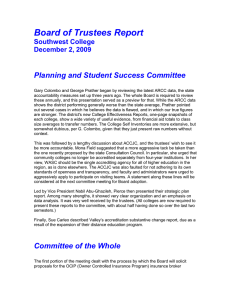PPA Support Group Meeting May 11 2012
advertisement
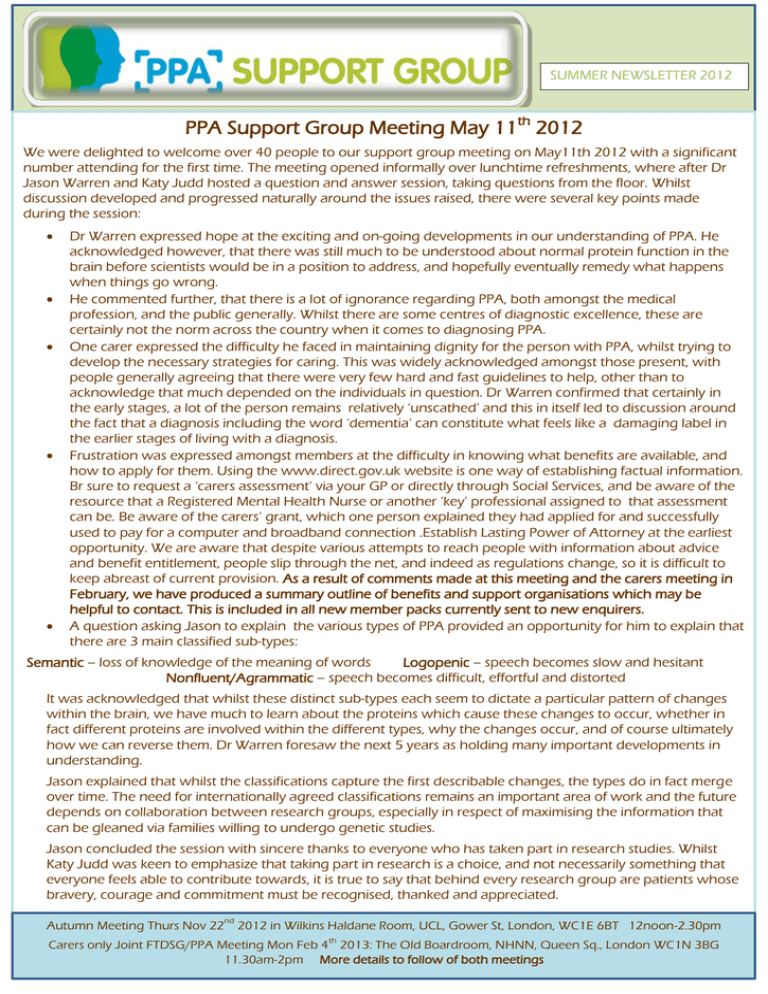
SUMMER NEWSLETTER 2012 PPA Support Group Meeting May 11th 2012 We were delighted to welcome over 40 people to our support group meeting on May11th 2012 with a significant number attending for the first time. The meeting opened informally over lunchtime refreshments, where after Dr Jason Warren and Katy Judd hosted a question and answer session, taking questions from the floor. Whilst discussion developed and progressed naturally around the issues raised, there were several key points made during the session: Dr Warren expressed hope at the exciting and on-going developments in our understanding of PPA. He acknowledged however, that there was still much to be understood about normal protein function in the brain before scientists would be in a position to address, and hopefully eventually remedy what happens when things go wrong. He commented further, that there is a lot of ignorance regarding PPA, both amongst the medical profession, and the public generally. Whilst there are some centres of diagnostic excellence, these are certainly not the norm across the country when it comes to diagnosing PPA. One carer expressed the difficulty he faced in maintaining dignity for the person with PPA, whilst trying to develop the necessary strategies for caring. This was widely acknowledged amongst those present, with people generally agreeing that there were very few hard and fast guidelines to help, other than to acknowledge that much depended on the individuals in question. Dr Warren confirmed that certainly in the early stages, a lot of the person remains relatively ‘unscathed’ and this in itself led to discussion around the fact that a diagnosis including the word ‘dementia’ can constitute what feels like a damaging label in the earlier stages of living with a diagnosis. Frustration was expressed amongst members at the difficulty in knowing what benefits are available, and how to apply for them. Using the www.direct.gov.uk website is one way of establishing factual information. Br sure to request a ‘carers assessment’ via your GP or directly through Social Services, and be aware of the resource that a Registered Mental Health Nurse or another ‘key’ professional assigned to that assessment can be. Be aware of the carers’ grant, which one person explained they had applied for and successfully used to pay for a computer and broadband connection .Establish Lasting Power of Attorney at the earliest opportunity. We are aware that despite various attempts to reach people with information about advice and benefit entitlement, people slip through the net, and indeed as regulations change, so it is difficult to keep abreast of current provision. As a result of comments made at this meeting and the carers meeting in February, we have produced a summary outline of benefits and support organisations which may be helpful to contact. This is included in all new member packs currently sent to new enquirers. A question asking Jason to explain the various types of PPA provided an opportunity for him to explain that there are 3 main classified sub-types: Semantic – loss of knowledge of the meaning of words Logopenic – speech becomes slow and hesitant Nonfluent/Agrammatic – speech becomes difficult, effortful and distorted It was acknowledged that whilst these distinct sub-types each seem to dictate a particular pattern of changes within the brain, we have much to learn about the proteins which cause these changes to occur, whether in fact different proteins are involved within the different types, why the changes occur, and of course ultimately how we can reverse them. Dr Warren foresaw the next 5 years as holding many important developments in understanding. Jason explained that whilst the classifications capture the first describable changes, the types do in fact merge over time. The need for internationally agreed classifications remains an important area of work and the future depends on collaboration between research groups, especially in respect of maximising the information that can be gleaned via families willing to undergo genetic studies. Jason concluded the session with sincere thanks to everyone who has taken part in research studies. Whilst Katy Judd was keen to emphasize that taking part in research is a choice, and not necessarily something that everyone feels able to contribute towards, it is true to say that behind every research group are patients whose bravery, courage and commitment must be recognised, thanked and appreciated. Autumn Meeting Thurs Nov 22 nd 2012 in Wilkins Haldane Room, UCL, Gower St, London, WC1E 6BT 12noon-2.30pm th Carers only Joint FTDSG/PPA Meeting Mon Feb 4 2013: The Old Boardroom, NHNN, Queen Sq., London WC1N 3BG 11.30am-2pm More details to follow of both meetings THE ROLE OF THE SPEECH AND LANGUAGE THERAPIST IN PPA Luke de Visser is a Speech and Language Therapist at the National Hospital for Neurology and Neurosurgery, and the group was delighted to hear him outline just what Speech and Language Therapy [SLT] can offer at The Luke de Visser is a Speech and Language Therapist at the National Hospital for Neurology and Neurosurgery. Luke has provided this summary of the presentation he gave at the meeting, and slides can be made available via Jill, at jill.walton@ftdsg.org, should anybody wish to have a copy. Speech and language therapy at the NHNN aims to provide a timely, ‘evidence-based’ service (a service based on research) for people with Primary Progressive Aphasia (PPA) and other forms of this condition and their communication partners. We also offer advice and guidance for services provided by community speech and language therapists if required. Everyone with PPA can access NHNN SLT services regardless of where they live. We also aim to share as much information available for people with PPA. At the NHNN, a standard of 6 SLT sessions will be offered for new clients referred. (This may vary). Clients may opt to be seen by their local service at any stage and long-term follow up is usually by informal review at the PPA groups. These groups are usually run 3 times a year. The treatment plan or “pathway” usually includes the following; Session 1 is usually an assessment of communication strengths and weaknesses to identify how the client usually communicates i.e. using speech, writing, pointing to pictures, a speaking device or a combination of all the above. This assessment also identifies who the client usually communicates with and their roles. I.e. partner, friend, family member, co-worker, customers (if still working). A range of speech and language tests both formal and informal can be used. In sessions 1-2, an assessment of other ways (augmentative, alternative strategies) to help communication is made. i.e. using an IPAD or an alphabet chart to help with expression of words and ideas, wants, needs etc. Sessions 1-6 would include practice and integration of any appropriate strategies to enhance communication, through modelling, rehearsing and home tasks involving significant communication partners. Information regarding appropriate high-tech communication aids and applications/software is also provided. Evaluation of strategy takeup, through re-assessment of base-line tests is also done. Sessions 1 and 2, and on-going sessions aim to introduce the concept of creating a communication notebook or profile. This profile includes information and photographs, pictures about the client e.g. family and friends, likes and dislikes, food and drink, leisure activities, holidays and interests, conversation topics etc. This can also include information about day to day things/activities. Sessions may aim to help the client and their communication partners use this profile in everyday situations with a view to independent use if appropriate (e.g. the client independently initiating needs/wants, ordering food at a restaurant, choosing a TV programme to watch etc. This profile may be created using an Ipad with an application called Proloquo2go and has been helpful for many clients with PPA. As client’s abilities vary, this technology is not appropriate for everybody as it requires a sound level of literacy and dexterity to access it. By session 5, provision of a communication card consisting of information about the client’s skills and any strategies to facilitate their communication may also be beneficial. This aims to maintain a client’s independence with communication. This might mean that a client can independently go to a café to order a coffee, or to buy a list of groceries from the shop for example. Sessions 1-6 aim to provide any education about PPA and its related conditions and communication partner training to practice strategies to support a client’s functional communication. These may include role plays and specific individualised training around levels of assistance/support needed for a person with PPA to use their communication strategies. The pathway may also include impairment-based therapy (working on the specific difficulties e.g. word finding). This is called neuro-protective therapy and consists mainly of drilling of functional words (written and/or spoken as appropriate) This is only generalised for the words practiced. These might include family names, names of objects used in everyday activities. This is a general outline of what SLT can offer at the NHNN, but it can vary based on a person’s strengths, weakness and level of participation. For more information please contact Luke de Visser at the National Hospital for Neurology and Neurosurgery at Queen Square on 02034484762 References McNeil, M.R. and Duffy, J.R ‘Primary Progressive Aphasia’ in Chapey, R (ed) (2001) Language Intervention Strategies in Aphasia and Related Neurogenic Communication Disorders 4th Edition; Baltimore: Lippincott, Williams, Wilkins Rapp, B., Glucroft, B. and Urrutia, J (2005) ‘The Protective effects of behavioural intervention in a case of primary progressive aphasia’ Brain and Language 95 (2005) 18-19 Rogers, M., King, J.. and Alarcon, N (2000) Proactive Management of Primary Progressive Aphasia, In D.R. Beukelman, K.M. Yorkston, & J. Reichle (Eds.),. Augmentative and alternative communication for adults with acquired. neurologic Disorders and neuromuscular Disabilities (pp 305-337) Baltimore: Paul H. Brookes
